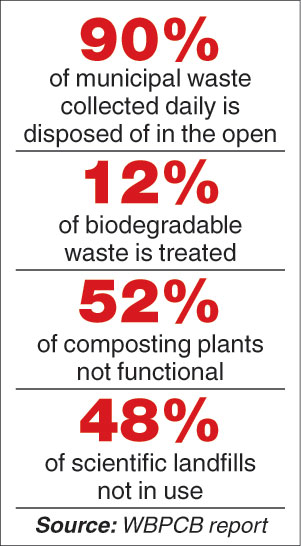
Calcutta: About 90 per cent of the municipal solid waste generated in Bengal every day is dumped in the open in violation of statutory pollution laws, raising the stink of alleged collusion with recycling rackets that have found a fortune in rubbish.
The West Bengal Pollution Control Board's Annual Report 2016-17 states that of the 14,000 tonnes of waste that needs to be disposed of daily, 830 tonnes are composted. Scientifically designed landfills like the one in Karmahati take in 515 tonnes of residual waste.
According to the report, of the 21 compost plants set up by municipalities, only 10 are currently operational. The number of landfills in use is 13. Another 12 aren't functioning for various reasons.
"These statistics show how waste management rules are being flouted with impunity. It is strange that while there is no provision in law for dumping untreated mixed waste, open dumping sites have mushroomed along the roadside and river banks in and around the Calcutta metropolitan Area," activist Naba Datta said during a programme organised by the green platform Sabuj Mancha.
Sasanka Dev of the voluntary organisation DISHA said the first step towards preventing mishandling and misuse of municipal solid waste was to focus on composting. "We have far fewer composting plants than required. The ones that exist are hardly used. Hardly any biodegradable waste comes to compost plants in most places."
The pollution control board's report mentions that around 1,400 tonnes of waste generated each day are not collected by municipal workers. Central waste management laws mandate that all municipal solid waste be segregated at source, based on which there can be recycling or composting. Residual non-biodegradable waste is to be dumped only in designated landfills.
What happens in reality is that even bio-medical waste gets recycled because of improper disposal. "Various studies have shown that only about 23 per cent of the bio-medical waste generated in Bengal gets properly treated," Dev said.
Activists and health care professionals allege that poor waste management amounts to wilful patronage of unscrupulous trade practices such as selling animal carcasses picked up from dumps as meat.
"The supply of rotten meat to restaurants and shops could be just the tip of the iceberg. The quantum of waste that is unscientifically dumped every day in violation of all norms indicates that this isn't just about inadequate resources," said an environmentalist who was at the Sabuj Mancha event.
A senior pollution control board official who did not want to be named said the onus was on municipalities and the urban development department to make waste management a priority beyond setting up compactor stations across Calcutta.
In India, municipal solid waste is defined as "commercial and residential waste generated in a municipal or notified area in either solid or semi-solid form, excluding industrial hazardous waste but including treated bio-medical waste".











